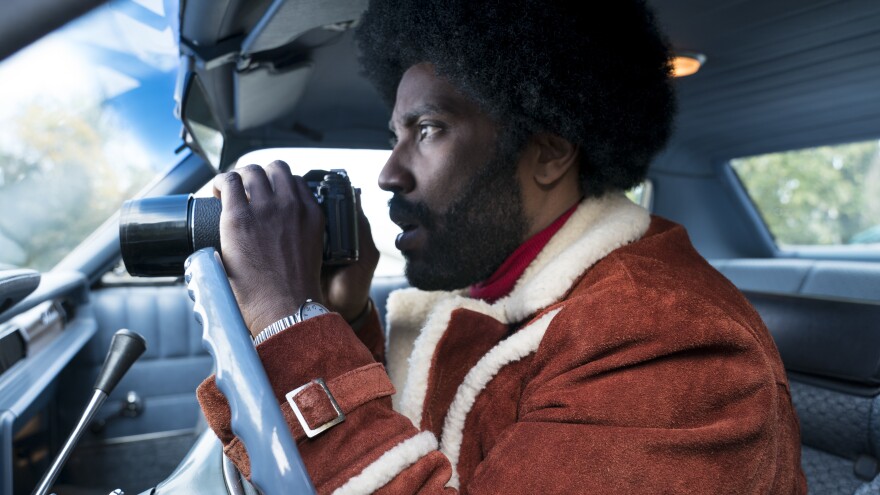When film critic Roger Ebert left the Cannes Film Festival premiere of Do the Right Thing in 1989, he had tears in his eyes. Few film-going experiences, he reflected in a 2001 essay, rivaled that first viewing of the Spike Lee classic.
A meditation on race in late-twentieth century America, the film's power comes from Lee's ability to avoid taking sides. He missed nabbing an award that year — something that would continue to happen again and again, over the years, not only at Cannes, but at the Oscars as well.
Twenty-nine years later, Lee's new film, BlacKkKLansman,premiered at Cannes to a ten-minute ovation from the audience. This time, the filmmaker garnered the festival's second-place prize. The buzz surrounding the film held that the movie represented a return to form for Lee, whose prodigious gifts have faltered over the last decade. But while BlacKkKLansman proves, in some regards, more entertaining than Do the Right Thing, it is a far less powerful work of art.
BlacKkKLansman is a genre film —a buddy-cop movie, specifically — with a message. Set in the '70s, rookie detective (and the only black cop on the Colorado Springs police force) Ron Stallworth (John David Washington) infiltrates a local chapter of the Ku Klux Klan over the phone by pretending to be white. He partners with a Jewish detective, Flip Zimmerman, (Adam Driver) who, posing as the bigot Stallworth created, stands-in for him in face-to-face meetings.
Zimmerman is the movie's one truly compelling character. He's a cop who, for most of his career, ignored the racism of his colleagues in order to uphold the fraternal order. But once he's deep inside the Klan, (when questioned about his ethnicity, Zimmerman says, "'Course I'm no stinkin' kike!"), his views start changing. In one of the movies best scenes, he tells Stallworth "I'm Jewish, yes, but I wasn't raised to be . . . I was just another white kid. And now I'm in some basement denying it out loud. I never thought much about it, now I'm thinking about it all the time."
Ron Stallworth should emerge as a far more three-dimensional character than he does here, given the contradictions he embodies: He's a soul brother, a Blaxploitation movie fan-boy ... but he sincerely believes he can help his people — black people — as a cop, and hates the term "pig." He's bound by duty, so when tasked with spying on a Stokely Carmichael rally, he obliges. These are the kinds of inner conflicts that could've been mined for more fruitful material.
Stallworth's romantically drawn to the head of the local college's Black Student Union, Patrice Dumas (Laura Harrier). Like many college students, Dumas is an activist archetype. She believes it's immoral to work on changing the system from the inside. Instead, she avows, you should fight against it as an outsider. She simply can't stomach that Stallworth's police, even after he saves her life.
"Truth is, I always wanted to be a cop," he says. "And I'm still for the liberation of my people." Dumas responds, "My conscience won't let me sleep with the enemy." This tension gets acknowledged in some stilted dialogue, but is never teased out more completely, which leaves both characters falling flat.
BlacKkKLansman's messaging, meanwhile, gets teased out too much. Spike Lee's never been known for restraint, but this movie is determined to hit its audience over the head, again and again ... and again. It does as much as it can to explain race in the twenty-first century — and I mean as much as it can.
Entire scenes devoted to characters referencing President Trump feel out of place, fail to move the story forward and cause long stretches of the movie to drag. In one particularly egregious example, a police sergeant explains to Stallworth that David Duke is taking the Klan out of their robes, putting them into suits and getting them involved in policy. This will continue, he says, in one of the script's many egregiously on-the-nose exchanges, until there's finally someone in the White House who reflects Duke's values.
Lee's messaging doeswork, and disturbingly well, at the film's coda however. He's incorporated documentary footage in his films before — in 2000's Bamboozled, memorably — and that device is employed powerfully here: We witness scenes of carnage from last year's "Unite the Right" rally in Charlottesville. Lee shows us a white supremacist plowing his car into a crowd of counter-protesters from multiple angles, ending on a photo of Heather Heyer, the white woman who died in that attack. It's effective, and sobering, and leaves you wondering how much things have changed since the time this film was set.
BlacKkKLansman is being hailed as Spike Lee's best film in over a decade, but I think it's likely more true that audiences are finally ready for what Spike has been serving up for a long time. The culture that his films arrive in is different, now: In a post-Charleston, post-Charlottesville, post-Trump world, people are ready for an unrelenting, powerful film about race.
This film isn't that — not completely, anyway — which is disappointing. But it isan entertaining jaunt through the '70s, with some dutiful grappling over the enduring question of race in America thrown in — if that's all you're looking for, BlacKkKlansman delivers that much, at least.
Copyright 2020 NPR. To see more, visit https://www.npr.org. 9(MDAxODc0NzU5MDEyMTgyMDUxMzlkN2IzMw004))


